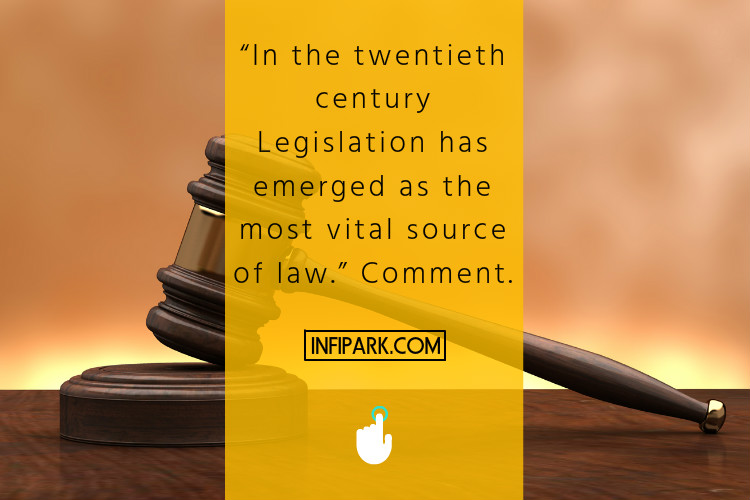“In the twentieth century Legislation has emerged as the most vital source of law.” Comment.
Or “Legislation is either supreme or subordinate.” Discuss.
Or Define legislation and give its kinds with illustrations.
Ans. Meaning of Legislation — The term ‘legislation’ is derived from two latin words, legis meaning law and latum means “to make” or “set”. Thus, the word ‘legislation’ means ‘making of law’. Legislation is that source of law which consists in the declaration of legal rules by competent authority. The term legislation has been used in different senses. In its broadest sense, it includes all methods of law-making. In its technical sense, however, legislation includes every expression of the will of the legislature,] whether making law or not. Thus, ratification of a treaty with a foreign State by an Act of Parliament shall be considered law in this sense. But in strict sense of the term, legislation means enacted law or statute law passed by the supreme or subordinate legislatures.
The different jurists have defined legislation in different ways —
1. According to Austin, “Legislation means any kind of law making process.”
2. According to Prof. Gray, “Legislation is the formal utterances of the legislative organs of the society.”
3. According to Salmond, the term ‘Legislation’ as a source of law is; used in three different senses —
(i) In Its Strict Sense-It is that source from where the rules of law declared by competent authority are framed.
(ii) In Its Widest Sense —Legislation includes all methods of law-making. In this sense, legislation may either be (i) direct or (ii) indirect. The law declared by legislature is called direct legislation whereas all other actions through which law is made are species of indirect legislation.
(iii) In Its Third Sense — Legislation includes every expression of will of the legislature whether making law or not.
4. Blackstone points out that the law that has its source in legislation may be most accurately termed as enacted law, and all other forms may distinguished as unenacted law. In England the former is called Statute law while the latter as Common law. Blackstone prefers to call them written and unwritten law. Thus, the Acts enacted by Parliament are statu-tory laws as they proceed from legislation whereas the customs which have assumed the shape of law are called common law in England. The common law is, therefore, customary law and unwritten in its nature.
Kinds of Legislation —According to Salmond, legislation may be divided into two kinds –
1. Supreme Legislation — Legislation is supreme when it pro-ceeds from the sovereign power is the State and is incapable of being repealed, annulled or controlled by any other legislative authority.
2. Subordinate Legislation — Subordinate legislation proceeds from any authority other than the sovereign power. It is dependent for its continued existence and validity on some supreme authority. Thus, in England the doctrine of parliamentary sovereignty implies supremacy and omnipotence of the British Parliament, Therefore, it possesses the power of supreme legislation. In India, however, the Parliament is sovereign but not supreme although it possesses the power of supreme legislation. Legislation by bodies inferior to the sovereign constitutes subordinate legislation.
Kinds of Subordinate Legislation — According to Salmond, the chief forms of subordinate legislation are –
1. Colonial Legislation —The British colonies and other depen-dencies were given limited power of self-government in varying degrees by the Imperial legislature. The colonies in the exercise of this power, enjoyed limited power of law-making. But the laws so made by colonial governments could be repealed, altered or superseded by the Imperial legislature viz. the British Parliament. However, after the passing of the Statute of Westminster of 1931, the self-governing Dominions under the Crown have been given power to make law independently subject to nominal supremacy of the British Crown.
2. Executive Legislation —The legislature i.e., the Parliament quite often delegates its rule-making power to certain departments of the execu-tive organ of the Government. The rules made in pursuance of this del-egated power have the force of law. They may, however, be repealed or superseded by the legislature as and when deemed necessary to do so.
3. Judicial Legislation —In certain cases legislative power of rule-making is delegated to the judiciary and the superior courts are authorised to make rules for regulation of their own procedure in the exercise of this power. This is also known as judicial legislation which should not be confused with judicial precedents where the court formulates a new prin-ciple of law through its judicial decision.
4. Municipal Legislation — The municipal authorities are allowed within their areas to make bye-laws for limited purposes such as water-tax, land urban cess, property-tax, town planning, public health, sanitation, etc.
5. Autonomous Legislation —The State may occasionally allow private entities or bodies such as universities, companies etc. to make bye-laws for regulating the conduct of their business. These bye-laws are framed in the exercise of the rule-making power conferred on these bodies by the State.








